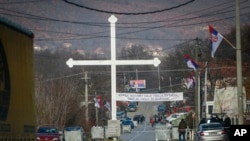Kosovo has reopened the main border crossing with Serbia, as Serbia’s President Aleksandar Vucic has announced dozens of other roadblocks in Northern Kosovo also would be removed.
Thursday, after days of the crossing between Kosovo and Serbia being blocked by barricades, trucks now can traverse it again. The removal of barricades blocking the main border crossing paves the way for easing tensions between Kosovo and Serbia, in a volatile Balkan region.
The blocking in the Merdare border crossing came as a gesture of support for Serbs in Northern Kosovo who had erected barricades for almost three weeks, protesting the arrest by Kosovo authorities of a former Serb policeman.
Kosovo police said the road blocked inside of Serbia’s territory had been “cleared for traffic." Other roadblocks, according to local media, also are being removed.
The end of the blockade was announced by the President Vucic following his meeting with Kosovo Serbs who erected the roadblocks 19 days ago, in protest over the arrest of a former police officer.
Vucic said the process of removing the roadblocks may take up to two days.
The announcement comes as welcome news, giving hope for easing tensions in the region.
Kosovo citizens in Pristina told VOA the removal of the blockades is the right move to end the crisis in the north.
“Nobody benefitted from these barricades. It only left the roads blocked for 19 days, the Serbs gained nothing from these barricades. It was just a populist move of Vucic in Belgrade," Mustafë Halili, a resident of Pristina told VOA Albanian.
"I think this is just one of their tactics. More than 20 years after the war, Serbia continues to use these kinds of maneuvers for its own political purposes and I think it will be repeated again. But we, our government, I think it should be more vigilant," Xhevdet Gjocaj says.
"It will present challenges for us. After the removal, talks will be intensified, as will the request for the formation of the Association of Serbian municipalities. This will be the first step and the Serbs will demand more," Adem Veseli says.
Kosovo Prime Minister Albin Kurti said Wednesday that "there is only a peaceful and democratic solution for the relations between Kosovo and Serbia, and that is mutual recognition."
The EU and the U.S. are mediating talks between Belgrade and Pristina and have voiced their relief the situation has been resolved.
Josep Borrell, EU high representative for Foreign Affairs and Security Policy, posted on Twitter welcoming the news as well: “Diplomacy prevailed in de-escalating tensions in north Kosovo. Violence can never be a solution. Welcome responsible leadership of President Vučić & Prime Minister Kurti. Great EU, US &@NATO_KFOR teamwork.”
A State Department spokesperson said, “We welcome the news about the reopening of the main border crossing between Kosovo and Serbia. For additional information, we refer you to the joint statement.”
The NATO-led peacekeeping Kosovo Force (KFOR) issued a statement, saying it welcomed the decision to remove the barricades in the north of Kosovo. “The removal of the barricades has to be done quickly, in a safe and secure way, avoiding any kind of incidents or risks. All parties should avoid any rhetoric or actions that can cause further escalation. KFOR is closely monitoring developments. We remain extremely vigilant and ready to intervene, if necessary.”
In his comment to VOA Serbian, Greg Delawie, former United States Ambassador to Kosovo, said, “I am very glad there seems to have been a peaceful resolution to this unfortunate situation. I hope both Kosovo and Serbia will reflect on the events of the last few weeks and redouble their efforts to achieve a durable peace for the benefit of all of their citizens.”
The conflict between Serbia and Kosovo dates to a war in the late 1990s. In 2008, following the war, Kosovo declared its independence, which is backed by the United States and the West, though Serbia does not recognize it.
Russia and China have supported Serbia’s position and its efforts blocking Kosovo’s membership in the United Nations and other global institutions. Since 2011, Pristina and Belgrade have been negotiating through an EU-led dialogue.
An estimated 50,000 Serbs are living in the north of Kosovo, which they assert is still part of Serbia.
In Kosovo, many were not happy with the decision to dismantle the barricades. Srđan Simonović from the Kosovo NGO Humani Centar Mitrovica, said in a comment to VOA that Serbian President Aleksandar Vucic’s decision to remove the barricades is illogical.
“In the end, Serbian people are losing, because if you look closely, we have an effective government here in Pristina that is governing in the rest of Kosovo and Metohija, but not yet in Northern Kosovo,” Simonović said.
Following the arrest of a Serbian ex-police officer, Dejan Pantic, December 10 on suspicion of attacking the Kosovo force, re-escalating the tensions, hundreds of ethnic Serbs set up roadblocks in northern Kosovo and paralyzed traffic through two border crossings. Additionally, reports of a rise in shootings, the latest of which occurred late on December 25, according to NATO-led peacekeeping force KFOR, added to a spiraling situation.
On Wednesday, Pantic was released from custody and put under house arrest after a request from the prosecutor’s office.
Budimir Nicic and Milan Nesic contributed to this report.
Some information for this story came from The Associated Press.




